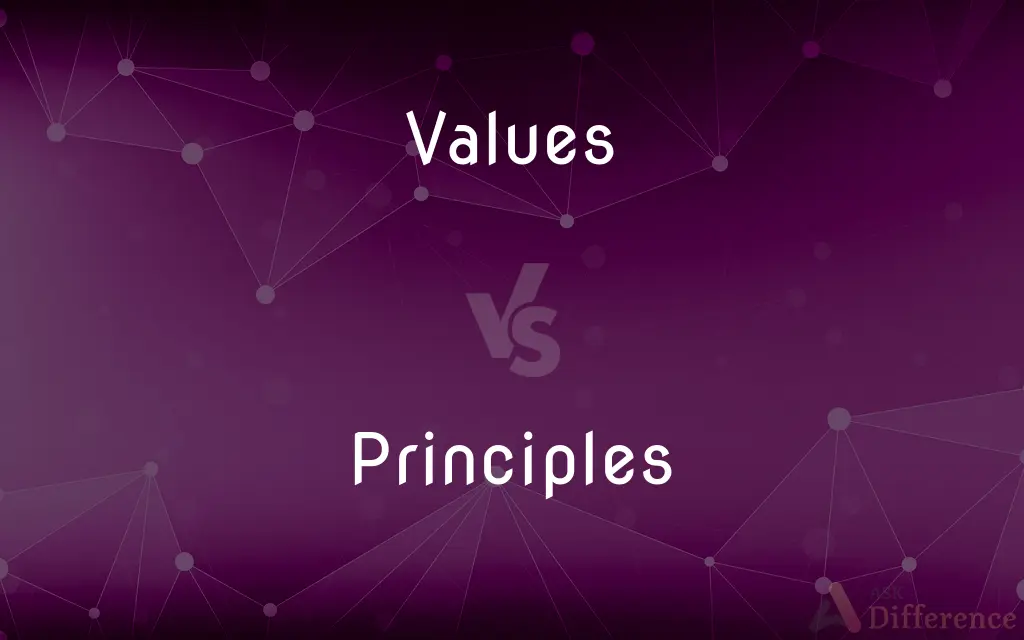Values vs. Principles — What's the Difference?
By Tayyaba Rehman — Published on November 24, 2023
Values are core beliefs guiding behavior, while Principles are universal rules or laws governing decisions.

Difference Between Values and Principles
Table of Contents
ADVERTISEMENT
Key Differences
Values refer to the inherent beliefs and convictions that an individual or society holds dear. They shape the framework within which people view the world and prioritize their decisions. Principles, on the other hand, are fundamental truths or laws that apply universally. They offer a set path or code of conduct to be followed in various circumstances. For instance, while values might dictate what is meaningful or significant to a person, principles provide the roadmap on how to act on those values.
Values often stem from cultural, religious, or personal experiences and can differ widely between individuals and societies. These are deep-seated notions that can influence emotions, responses, and even one's sense of purpose. Principles, conversely, transcend individual or cultural beliefs. They are overarching guidelines, like honesty or fairness, that serve as a foundation for ethical decision-making across diverse contexts. So, while someone might value ambition because of personal experiences, they might adhere to the principle of hard work to achieve their goals.
Values can be subjective and malleable, potentially changing over time based on life experiences and personal growth. They're intrinsic, rooted in emotions and personal biases. Principles stand as more objective, often derived from logical reasoning or shared human experiences. They remain constant regardless of changing values or emotions. For example, an individual might value wealth, but the principle of honesty would prevent them from achieving it through deceit.
In summary, while values are the bedrock of personal beliefs and priorities, principles are the universal tenets guiding how to act upon those beliefs. Both play an essential role in shaping behaviors, but they operate on different spectrums of personal and universal significance.
Comparison Chart
Nature
Subjective and personal beliefs
Universal rules or laws
ADVERTISEMENT
Origin
Derived from personal or cultural experiences
Based on logical reasoning or shared human experiences
Flexibility
Can evolve over time
Generally constant across diverse contexts
Purpose
Dictate what is meaningful or significant
Provide a roadmap on how to act on values
Application
Influence emotions and responses
Guide ethical decision-making
Compare with Definitions
Values
Core beliefs that guide behaviors.
Family is one of her core values.
Principles
Ethical standards followed consistently.
Good principles are the backbone of moral integrity.
Values
Inherent standards influencing priorities.
His values were evident in his charitable acts.
Principles
Universal guidelines governing behavior.
The company operates on principles of fairness.
Values
Personal convictions held dear.
Her values always guide her decisions.
Principles
Fundamental truths or propositions serving as foundations.
He lives by the principles of honesty and integrity.
Values
Deep-seated notions shaping one's worldview.
Their values align, making their relationship strong.
Principles
Rules defining right from wrong.
Her principles prevent her from lying.
Values
Principles or standards of behavior.
She was taught good values from a young age.
Principles
Basic ideas or laws that explain or guide actions.
Principles of justice are paramount in a court of law.
Values
An amount, as of goods, services, or money, considered to be a fair and suitable equivalent for something else; a fair price or return.
Principles
A basic truth, law, or assumption
The principles of democracy.
Values
Monetary or material worth
The fluctuating value of gold and silver.
Principles
A rule or standard, especially of good behavior
A man of principle.
Values
Worth in usefulness or importance to the possessor; utility or merit
The value of an education.
Principles
The collectivity of moral or ethical standards or judgments
A decision based on principle rather than expediency.
Values
Often values A principle or standard, as of behavior, that is considered important or desirable
"The speech was a summons back to the patrician values of restraint and responsibility" (Jonathan Alter).
Principles
A fixed or predetermined policy or mode of action.
Values
Precise meaning or import, as of a word.
Principles
A basic or essential quality or element determining intrinsic nature or characteristic behavior
The principle of self-preservation.
Values
(Mathematics) A quantity or number expressed by an algebraic term.
Principles
A rule or law concerning the functioning of natural phenomena or mechanical processes
The principle of jet propulsion.
Values
(Music) The relative duration of a tone or rest.
Principles
(Chemistry) One of the elements that compose a substance, especially one that gives some special quality or effect.
Values
The relative darkness or lightness of a color. See Table at color.
Principles
A basic source. See Usage Note at principal.
Values
(Linguistics) The sound quality of a letter or diphthong.
Principles
Plural of principle
Values
One of a series of specified values
Issued a stamp of new value.
Values
To determine or estimate the worth or value of; appraise.
Values
To regard highly; esteem
I value your advice.
Values
To rate according to relative estimate of worth or desirability; evaluate
Valued health above money.
Values
To assign a value to (a unit of currency, for example).
Values
Of or relating to the practice of investing in individual securities that, according to some fundamental measure, such as book value, appear to be relatively less expensive than comparable securities.
Values
Relating to or consisting of principles or standards
A value system.
Values
Inflection of value
Values
Beliefs of a person or social group in which they have an emotional investment (either for or against something);
He has very conservatives values
Common Curiosities
Can Values change over time?
Yes, values can evolve based on personal experiences and growth.
How do Values impact decision-making?
Values shape our priorities and determine what we consider important or meaningful.
Can two people have completely different Values?
Yes, values are personal and can vary widely between individuals.
What are Values?
Values are core beliefs and convictions guiding individual or societal behaviors.
Why are Principles important in ethics?
Principles provide a consistent foundation for determining right from wrong.
How do Values influence emotions?
Values, being deeply-held beliefs, can strongly influence emotional responses.
Can someone's actions be against their Principles?
Yes, individuals can sometimes act contrary to their principles due to various reasons.
How do Principles differ from Values?
Principles are universal rules or laws governing actions, while values are personal beliefs.
Are Principles universally accepted?
Principles are universal truths, but their interpretation can vary.
Do Principles change across cultures?
Principles are universal, but their interpretation or emphasis might differ across cultures.
Can Principles conflict with each other?
At times, principles can appear conflicting, requiring careful consideration to resolve.
Are Values always positive?
Values are subjective; what's positive to one person might not be to another.
How are Principles used in professional settings?
Principles often form the ethical foundation or code of conduct in professional environments.
Is it possible for a society to share common Values?
Yes, cultural or societal values are beliefs shared by members of a particular community or group.
Why are Values important in personal growth?
Values guide personal decisions and behaviors, impacting life's direction and fulfillment.
Share Your Discovery

Previous Comparison
Thermal Conductivity vs. Heat Transfer Coefficient
Next Comparison
Human Being vs. Being HumanAuthor Spotlight
Written by
Tayyaba RehmanTayyaba Rehman is a distinguished writer, currently serving as a primary contributor to askdifference.com. As a researcher in semantics and etymology, Tayyaba's passion for the complexity of languages and their distinctions has found a perfect home on the platform. Tayyaba delves into the intricacies of language, distinguishing between commonly confused words and phrases, thereby providing clarity for readers worldwide.












































